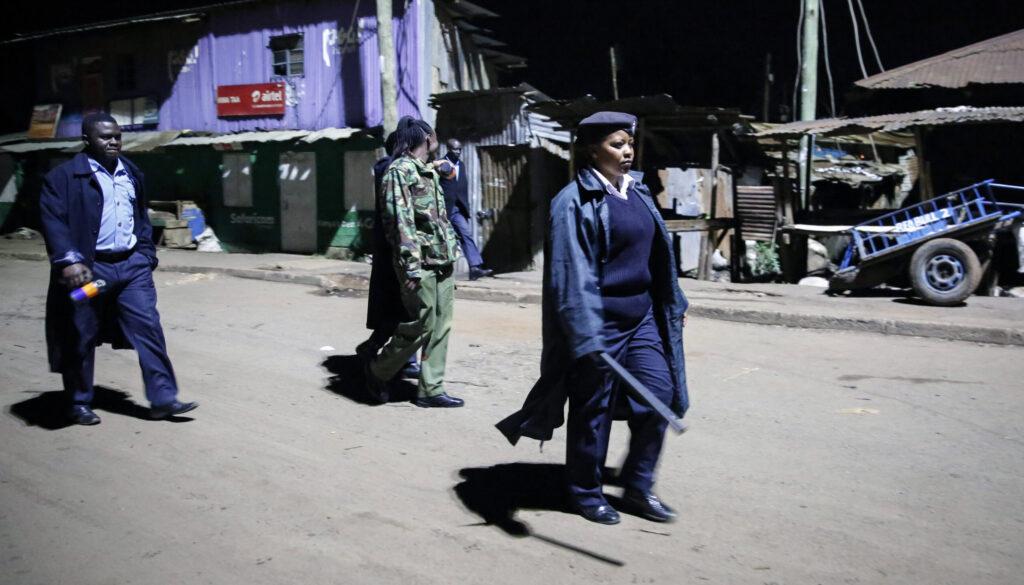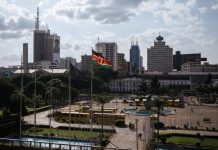Africa-Press – Mauritius. Nairobi is a city on edge, as its 4.4 million residents try to avoid getting infected from coronavirus during the day, during the dusk-to-dawn curfew, they try to avoid police brutality.
The spread of COVID-19 has changed how cities the world over operate, but Kenya’s cities are perhaps unique in the fact that police brutality has led to more deaths than the pandemic itself.
The country’s law enforcement is imposing a dusk-to-dawn curfew that began last Friday and is meant to remain in place for security reasons. Among the first victims of police brutality was a journalist, even though media houses and their staff are exempted from curfew rules
By Thursday 2 April, the curfew enforcement led to at least five deaths, including that of a 13 year-old boy who was shot while sitting with his family on their balcony.
“Where is our safety if not in our own homes? We want justice for my boy.
We know nobody can bring my son back to life but I hope the perpetrator does not go unpunished,” Yusuf Moyo, the teenager’s father, said in an interview.
The curfew has changed Nairobi in particular more than the pandemic, as 3pm is the new hour of ending the work day, with people closing up shop and heading home.
On Wednesday, an Uber driver, David Musyoki, told The Africa Report that he had to pay a Shs. 300 bribe to be let through a police roadblock at 7:10pm – the curfew starts at 7:00pm – but enforcement from the first day began as early as 6:00pm.
“Everyone was being stopped on both sides of the road,” Musyoki said on a phone call shortly after he got home, “and we all had to pay to pass.
They didn’t care who you were or where you were going. ” Bribery is an easy price to pay, but an unknown number of other Kenyans heading home have been beaten with clubs and whips.
At least two boda boda taxi riders from the West and the South of the capital have died as a direct result of the beatings. Violence or right-out violation of the rules is also a problem.
On the first night of the curfew, police officers grouped together hundreds of Kenyans on their way home, clearly defeating the purpose of social distancing in the middle of a pandemic.
By Thursday, Kenya had tested just over 2,200 people. It has 110 confirmed cases, with three deaths and four recoveries within its borders. At least two other Kenyan citizens have also died from COVID-19 in the United States.
The spread of the virus is now in community clusters, pushing the country’s authorities to discourage gatherings and issue new rules almost every passing day.
Such new rules can be disorienting. For example, while the dusk-to-dawn curfew that began a week ago had exemptions for critical and essential staff; nearly everyone is home by 6pm.
Nearly all supermarkets, which were listed as exemptions to the curfew rules, were closed by 5:30pm on the first day so staff could take stock and be home on time.
Kenya’s largely informal transportation systems have been hardest hit, as the country’s transporters try to find a balance between new social distancing rules and providing an essential service.
Boda boda taxi riders, for example, have to work with a new raft of rules that will significantly reduce their margins, at a time when many people are not leaving their homes.
Tied to transporation is the informal sector that finds their clients among the commuters. “There’s simply no business,” says Emmanuel Koech, a bottled water hawker in the capital.
“You go to sell someone water and they close their window on you long before you get there.
Koech adds that he spent Monday trying to get his wife and two children out of Nairobi; a complicated venture because transportation costs have gone up due to social distancing rules and scarcity.
He then had to dodge police on his way home afterwards. But it is not all gloom for everyone. “I can’t remember the last time I slept for 13 straight hours,” an electronic store dealer tells The Africa Report, “because we normally close at 10pm and now I have to be home by 7.
” A public relations professional, whose employer had initially refused to let staff work from home, also said the curfew had been the deciding factor.
“I am now working from home but I would really rather be in the office,” she says over a phone call, laughing as her kids scream and play in the background.
One well-founded fear in Nairobi is that the country has far more cases than it is acknowledging or testing. On 29 March, local media houses reported at least 17 infant deaths in Kilifi, a coastal county south of the capital, from pneumonia-like symptoms.
Most of the children died within days after exhibiting symptoms in early March, but the reports did not indicate any transmissions. The other reason is that like many countries, Kenya has only been testing suspected COVID-19 cases, mostly people with a recent travel history.
While the Cabinet Secretary of Health Mutahi Kagwe said the government would begin randomized testing, the shift from individual to community spreading will strain resources and make it harder to get to patients in good time.
The country’s healthcare system has also been progressively privatizing as part of its Vision 2030, which means people cannot get free testing unless they are already suspected of having had contact with the virus.
“At our laboratory, in Kenya we currently charge $110-$130 depending on whether a clinic referred [a] sample or a walk-in patient [was] referred by a doctor,” writes Dr.
Ahmed Kalebi, the Founding Partner and CEO of Lancet Group of Labs, in an email to The Africa Report. The cost, he adds, has already dropped from $170 to its current value during the last week of March.
The patients pay out of pocket as insurance companies currently do not cover for any privately done tests. Kalebi adds that samples have to be sent to the parent group’s reference laboratory in South Africa.
“We are in the process of setting up testing in our Main Lab in Nairobi and hope to roll out testing soon which will be cheaper at around $70 – $80, and also faster, with a turn-around-time of same day.
What about test kits donated by Chinese billionaire Jack Ma? A government medic, who asked to remain anonymous, says there remains a lack of widespread testing despite receiving such a donation because the kits did not come with critical extractors and consumables.
“We can’t use them as is,” he writes in a text message.
While Nairobi has been recruiting new frontline healthcare staff, several who spoke to The Africa Report say it does not matter how many are recruited if it is not matched with extensive training, testing, and resource management.
On 27 March, a major hospital in Nairobi quarantined several healthcare workers following the death of a 66 year-old COVID-19 patient in its ICU. The patient, who was Kenya’s first death from the virus, had not disclosed his recent travel history to healthcare staff upon his first hospital visit.
“Since this was discovered, we took the necessary precautions immediately. The affected clinicians are currently under quarantine for the required 14 days,” the hospital’s chief of staff told a local daily.
Such events will only make hospitals, public and private, more wary of treating any walk-ins, especially as the pandemic is now spreading across community clusters.
The governor of Mombasa, Hassan Joho, threatened legal action against private hospitals for turning away patients with COVID-19 patients. But healthcare staff at a public hospital were the first to do exactly that.
“The panic and pandemonium I have seen inside here demonstrates that we’re not prepared for this coronavirus,” a nurse at the hospital told The Star.
“Everybody fled and we had to reorganise ourselves to pick the patient and isolate him.
” Bottom line: As the country begins April with over 100 confirmed cases at the time of this publication, it is certain the numbers will keep rising.
While President Kenyatta apologized to the nation “maybe for some excesses which were conducted or happened” during a video conference, police brutality and corruption is a weak point in his administration’s response to the growing pandemic.
For More News And Analysis About Mauritius Follow Africa-Press







